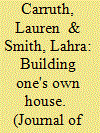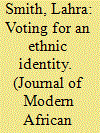| Srl | Item |
| 1 |
ID:
183922


|
|
|
|
|
| Summary/Abstract |
This study uses ethnography along Ethiopian women's irregular migration routes through Djibouti to analyse the complex reasons women leave home to seek labour opportunities in the Gulf States. Theories and policies that either narrowly depict women's motivations as economic in nature or focus only on women's needs for security and protection, fail to account both for the politics of seeking employment abroad, and the ways migration provides women a potential refuge from various forms of violence at home. Using a feminist analysis, we argue that women do not migrate only for financial opportunities, but also to escape combinations of domestic, political and structural violence. As such, irregular migration both evinces a failure of asylum systems and humanitarian organisations to protect Ethiopians, and a failure of the state to provide Ethiopian women meaningful citizenship. Lacking both protection and meaningful citizenship, international migration represents women's journeys for opportunity and emancipation.
|
|
|
|
|
|
|
|
|
|
|
|
|
|
|
|
| 2 |
ID:
080053


|
|
|
|
|
| Publication |
2007.
|
| Summary/Abstract |
The literature on democratisation in diverse and divided societies suggests that procedural and institutional innovations can help create the conditions for democracy by adjudicating among groups with competing claims for recognition and inclusion. Some of the most critical assumptions about the relationship between ethnic identity and formal political institutions have been tested in Ethiopia since the early 1990s. Ethnic federalism is a unique and controversial attempt to account for the contested nature of ethnic identities in contemporary Ethiopian politics through a variety of mechanisms, including the use of a referendum to determine ethnic identity. In 2001 the Siltie people voted to separate from the Gurage ethnic group. With this political manoeuvre, the Siltie accessed greater levels of political power and greater resources, but also recognition under the constitutional arrangement as a distinct ethnic group. The Siltie case suggests that formal political institutions have a limited, though important, role in resolving contested citizenship claims. At the same time, it raises vital questions about the challenges of procedural solutions in the context of contested citizenship and democratic transition in sub-Saharan Africa
|
|
|
|
|
|
|
|
|
|
|
|
|
|
|
|